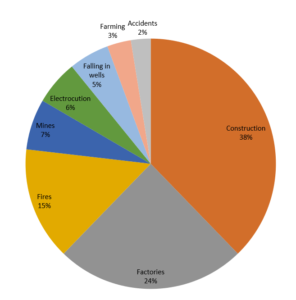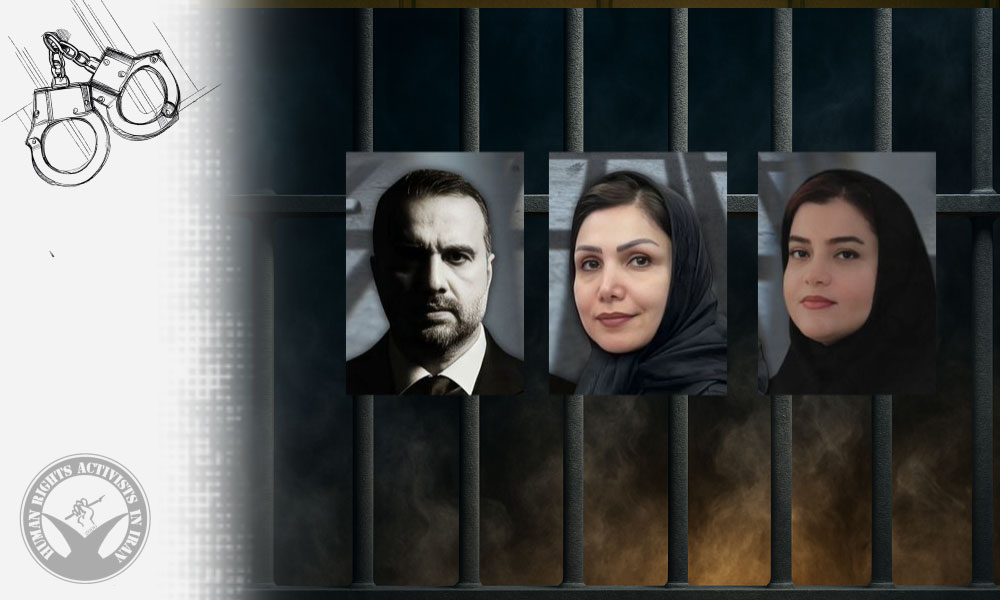On the occasion of International Workers’ Day, or May Day, Human Rights Activists in Iran (HRA) highlights the ongoing denial of the full enjoyment of workers’ rights in Iran; namely workplace discrimination, child labour, violations of the right to form and join labor unions and the suppression of the right to peaceful assembly and association often resulting in unfair trials, arbitrary detention, and torture at the hands of Iranian officials. The following article provides a brief overview of the situation of labour rights in Iran as well as identifies several individuals known to be responsible for violating the rights of Iranian workers’ and labour rights activists. The noted violations are in stark contrast to Iran’s International human rights obligations (including ratified ILO Conventions, CRC, ICCPR, and ICESCR) and therefore should not go unpunished.
The Situation of Labour Rights in Iran
The Right to Form and Join Labour Unions
In the past year, a total of 593 workers’ protests and 738 trade union protests have reached the media and or civil society organizations.
Among the most important labor events in Iran over the past year the following workers’ protests can be mentioned; Haft Tappeh sugarcane workers, Kut-e Abdollah Municipality, Heavy Equipment Production Company (HEPCO) in Arak, railway technical lines and buildings, and the union protests of teachers, retirees and social security pensioners.
Over the past 12 months, various cities in Iran have witnessed various forms of protest movements by Iranian workers. A wide range of workers have taken to the streets due to non-receipt of their monthly salaries and disregard for their insurance claims, and some of these workers have gone on strike and protested for up to 30 months of wage arrears. Thus, 114 labor strikes and 3 union strikes have taken place.
The level of cohesive demand of different sections of the working class has been unprecedented in the past year. Repression and sabotage and non-recognition of the rights of trade unions and independent labor organizations, arrest and imprisonment of several labor activists, as well as the denial of the right to protest were among the reasons for the dispersal and disorder of some labor rallies and protests.
Many workers have been summoned, arrested or convicted on charges such as holding a peaceful rally on International Workers ‘Day, protesting against low wages, signing statements in support of trade unions, posting photos of workers’ demonstrations on the Internet or receiving invitations to attend world trade union meetings.
At least 37 workers and labor activists have been arrested in the past 12 months. Among the most important of these arrests are the arrests of four Haft Tappeh workers’ activists, five Kut-e Abdollah Municipality workers, six participants in a rally in support of the Haft Tappeh workers, and tens of nurses and teachers.
Additionally, 46 labor activists were sentenced to 636 months in prison and 3,108 floggings, 51 people were summoned to judicial and security authorities, 1,331 were fired or suspended from work, 4,224 were unemployed, 28,493 uninsured workers and 4,224 uncertain of their work situations.
Also, in the field of unions and syndicates, a total of 47 arrests of union activists, 30 months’ imprisonment for 2 union activists, 50 summonses to judicial-security authorities and 132 cases of closure of places have been reported.
Both the ICCPR (Article 22) and ICESCR (Article 8), to which Iran is a State party, guarantee the right to form and join labor unions. However, under Iranian law, there exists no express right to form labor unions that are independent of the State. Claiming ‘security concerns’, workers may only be represented by a select group of State sanctioned bodies. Nonetheless, groups like the Haft Tappeh Sugar Cane Workers’ Syndicate and others continue to form and gather to protest widespread violations of labour rights. The Haft Tappeh Workers’ Syndicate is a union responsible for the organization of several protests regarding violations of workers’ rights – notably, withheld wages, unfulfilled promises, and the arbitrary detention and torture of many of their members.
The violations against the Haft Tappeh Workers’ and others are not only in contrast to the core human rights treaties to which Iran is a State party but also ILO Conventions. As a founding member of the International Labor Organisation (ILO), the Islamic Republic of Iran was one of the first countries in the sub region to join the organization. Iran has ratified 13 ILO conventions including five of the eight so-called core conventions. These conventions are legally binding upon signature.
In addition to poor working conditions labor rights activists are increasingly peacefully protesting discriminatory practices in the workplace, minimum wages set below poverty lines as well as increasingly low pensions, only deepening the economic hardship felt across the country.
Discrimination in Iranian Law
Iran’s national legislation remains discriminatory as a matter of law. Although the Iranian Constitution includes protection for labour rights, all legislation must be in line with Islamic principles (Article 4). This interpretation of the law allows for women and religious and ethnic minorities to face increased discrimination in the workplace based in Islamic principles. Likely in part due to these practices, the World Economic Forum’s 2020 Global Gender Report placed Iran at number 147 out of 153 for economic participation and opportunity.
Child Labour
The number of Working Children in Iran is between 3 to 7 million, while this figure is estimated at 20,000 for Tehran, yet considering that most working children do not have proper identifications; it is not possible to provide a more accurate statistics regarding the actual number of working children in Iran.
National legislation prohibits children under the age of fifteen to work. However, in practice, child labour remains present at an alarming rate. Iran’s obligations under the Convention on the Rights of the Child prohibit child labour in any form. In addition, the UN Committee on the Rights of the Child has expressed grave concern at the alarming number of children employed in hazardous conditions. Iran should ensure full compliance with international child labor standards, including in the CRC and relevant ILO Conventions.
Women in the Workplace
Prohibition of child labor and the provision of free education for children, the establishment of the highest level of safety standards in the workplace, the elimination of discriminatory laws for migrant women and workers are other demands of the working community.
Despite the fact that Iranian women workers are described as the cheapest labor force in the country, the employment situation of women is more precarious than men, and at the same time as noted above they have far less legal protections, salaries and benefits.
Female workers have less bargaining power than their male counterparts. At the same time, production and industrial units are less inclined to employ married women, and in some cases employ single women with a commitment not to marry or become pregnant.
The situation of working women in small workshops is much worse. Half of the workers in the kilns are women who work in onerous conditions.
Spreading Justice: Labour Rights Violators- at a glance
Omid Asadbeigi, Morteza Bahmani, Sadegh Jafari Chegeni, and Mustafa Nazari, all profiled in Spreading Justice are responsible for countless violations against Haft Tappeh workers, labor rights activists supporting them, and journalists documenting the unrest.
– Omid Asadbeigi, Owner and Managing Director of the Haft Tappeh Sugar Cane Agro-Industry Co (hereinafter Haft Tappeh), is known to have arbitrarily withheld wages of his employees in addition to colluding with law enforcement agencies and the judiciary of the Islamic Republic of Iran to intimidate and exploit workers. These actions are in stark contrast to obligations under the 13 ratified International Labour Organization Conventions to which Iran is a signatory. Significantly, amongst the Conventions ratified by Iran are: The Employment Policy Convention, 1964 (No. 122) and the Protection of Wages Convention, 1949 (No. 95). The ILO Conventions are legally binding upon signature. According to the legal review conducted by HRAs Spreading Justice Legal Consultant, Brian Currin, “It is evident that Asadbeigi does not only fail to comply with the most basic obligation of an employer, namely the payment of wages, but in addition he colludes with law enforcement agencies and the judiciary of the Islamic Republic to intimidate and exploit workers.”
– The Shush Security Police have been responsible for the unlawful arrests and detention of workers and have forcefully suppressed workers’ right to protest and strike. Morteza Bahmani is the head of the Shush Security Police and is responsible for and directly involved in the aggravated assault and torture of workers at Haft Tappeh as well as labor rights activists considered to be their supporters. As stated by SJ Legal Consultant, Brian Currin, “Morteza Bahmani’s actions are the antithesis of what is expected of a State that is a founding member of the ILO and should be condemned by the international community that embraces the practices, ethos and values of the ILO.”
– As the chief of the Shush Judiciary, Sadegh Jafari Chegeni has committed countless human rights violations, particularly workers’ rights violations. According to the workers of Haft Tappeh, Sadegh Jafari Chegeni was one of the main perpetrators of the repression of protesting Haft Tappeh workers. In addition, evidence of his involvement in the economic corruption involving the CEO of Haft Tappeh (Omid Asadbeigi noted above) has also been publicly mentioned by Haft Tappeh workers.
– As the prosecutor of Shousha, Mostafa Nazari has been directly involved in and responsible for widespread human rights violations, especially the rights of workers, as well as the right to freedom of peaceful assembly and association. According to numerous reports, he was one of the main perpetrators of the crackdown on the protesting workers of Haft Tappeh as well as their unfair judicial treatment.
*It is of note that the violators highlighted in this report are merely a select few. For more information on the violators within, please view the profiles in their entirety by clicking on the individual names.
A Statistical glance at the Situation of Iranian Workers 2020-2021
In Iran, Labor Day comes at a time when the privatization of state-owned factories and companies continues without regard to the long-term interests of workers.
According to Human Rights Activists in Iran’s (HRA) statistics department, a review of labor reports published in the last 12 months (April 30, 2020 to April 27, 2021), indicates at least 9,367 workers were killed or injured in work accidents.
Injuries:
At least 7577 workers were injured at work in the past 12 months. In 12 official reports or comments at the national and provincial levels, officials reported that 7073 people were injured. In addition to the official reports, Civil and labor rights activists reported another 504 cases of injuries at work.
Deaths:
At least 1790 workers lost their lives in work accidents in the past 12 months; Officials and relevant agencies reported the deaths of 1,545 workers in 9 official reports, while independent organizations reported 245 deaths of workers that were not mentioned by official reports and authorities.
Actual numbers might be a lot higher
It should be noted, even though statistics above are many, the reality might be much harsher due to lack of transparency of the responsible institutions, many of work incidents are not reported and thus do not make it to the media.
To better understand this issue, “Iran announced that 15,997 people lost their lives in work-related accidents in the last 10 years (2008-2018), 15,767 were men and 230 were women.” This means that an average of 1,600 people has lost their lives each year in work-related accidents over this decade.
According to these statistics, the main cause of death in work accidents is falling from a height. In the last ten years, that is about 41.5% of total casualties at work accidents. Iran ranks 102nd in the world in terms of occupational safety.
Occupational Accident Classification Chart

Wage Arrears
According to statistics compiled by HRA’s statistic Department, at least 34,318 workers have more than 2,313 months of wage arrears.
However, it should be noted that among the published reports on wage arrears, a large number of reports did not mention the number of workers awaiting wage arrears, which is one of the important factors in the impossibility of providing accurate statistics of workers claiming arrears.
Poverty line and low wages
On Sunday March 14, 2021, the Supreme Labor Council implemented a 39% increase in the minimum wage, that is the minimum monthly salaries were increased from 1 million and 912 thousand Tomans to 2 million and 650 thousand Tomans.
Although the Iranian government has refused to officially announce the poverty line, economic activists believe that the minimum wage is still well below the poverty line even after this increase.
Also, the members of the Supreme Labor Council increased the workers ‘food rations to 450,000 Tomans and the workers’ housing allowance to 600,000 Tomans. It should be noted that housing allowance is not implemented yet and to be implemented must be approved by the Council of Ministers and then be included in the next year’s payroll of workers.
These figures are being ratified while the head of the labor faction of the 11th parliament has previously stated that even if the minimum wage rises by 100 percent, workers purchasing power will not return to normal.
In addition, the increase of workers’ salaries by a small amount to 2 million and 650 thousand Tomans has been approved while recently the head of the Supreme Association of Trade Unions, referring to the announcement of the Central bank that poverty line is at 10 million Tomans, said: “Last year the poverty line was 6 million Tomans, which has increased by 4 million Tomans this year.”
On the other hand, Faramarz Tofighi, the workers’ representative in the wage determination committee, had previously said: the acceptable cost of essentials (food, etc) is 6 million and 895 thousand Tomans. This is while in the final agreement, the minimum wage for the year 1400 (Jalali Calendar) is set at only 2 million 656 thousand Tomans, and this is about 3 million Tomans less than what the workers representatives indicated as cost of essentials.
In addition, Ali Asgarian, Deputy of Public Participation of the Relief Foundation, announced: According to the monitoring of the monthly observation center, which defines food poverty line by 1800 sampling points, now the food poverty line is 670 thousand Tomans per person and if the family consider three people with the minimum wage, many working families are below the poverty line or at the food poverty line. He added that about 20 million people in the country need support; “Currently 6.5 million people are covered by the Relief Foundation and there are about 7 million other people who have similar conditions but are not covered by this organization. There are also another 14 million people in need in the country who are not receiving any assistance.”
The minimum wage set by the Supreme Labor Council, according to many experts and labor activists, is much lower than the real inflation rate in the country and lower than the value of the household consumption basket. This is another reason for the continuation of the protests of the working community of the country.
Obligations
Violations against labor rights activists and workers alike are in stark contrast to Iran’s international human rights obligations namely, the Convention on the Rights of the Child (CRC), the International Covenant on Civil and Political Rights (ICCPR), the Convention on Economic Social and Cultural Rights (CESCR), and relevant ILO Conventions. Iran should ensure full implementation of the noted mechanisms and protect the rights of workers’ by removing discriminatory barriers to workplace participation particularly on women and ethnic and religious minorities. In addition, HRA calls on the international community to hold the above and all perpetrators accountable for their actions against Iranian workers’ ending the widespread impunity enjoyed in the Islamic Republic of Iran.
This Article has been prepared by Spreading Justice team, For further inquiries please contact Skylar Thompson, Senior Advocacy Coordinator Human Rights Activists in Iran (HRA) at [email protected]







